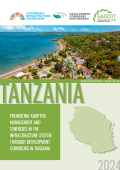The world of work and the natural environment are closely interconnected. Approximately 1.2 billion jobs globally depend directly on ecosystem services in sectors – like farming, fishery and forestry – that rely on naturally occurring soil renewal and fertilization, and air and water purification. However, the impacts of environmental challenges on the world of work are unevenly distributed and tend to exacerbate existing inequalities and vulnerabilities. They disproportionately affect workers in lower-income countries, rural workers, people in poverty, indigenous and tribal peoples and other disadvantaged groups, a trend that will only intensify. Thus, it is now essential for projects to address environmental pressures while also promoting decent work and poverty eradication.
This brief provides a demonstration case to help projects grappling to understand how to incorporate an environmental lens while conducting a market systems analysis for employment outcomes. It unpacks the lessons learned from a market systems analysis conducted by the ILO Green Jobs Programme on Tanzania’s horticulture sector and is intended to provide inspiration for identifying both the key constraints and opportunities to create both better employment and enhance the environment.



